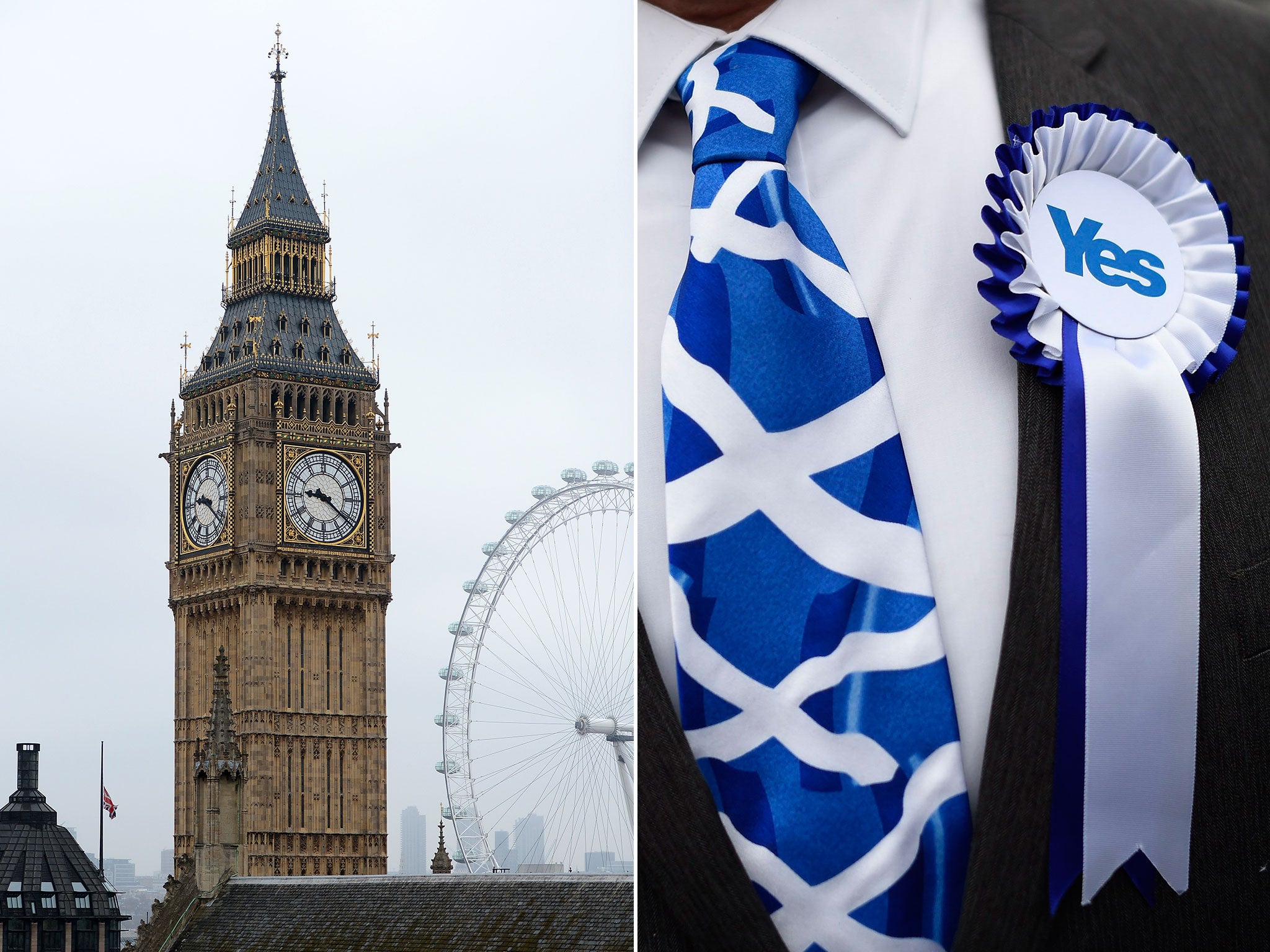To hear the Yes campaigners, you’d think London was the most evil place on Earth
I’ve had it with people freely expressing their contempt for our capital city. Let London be free, independent of the UK

I was in Sicily last week and so missed the day Scotland voted to stay in the Union. There was no TV and only intermittent wi-fi where we were staying high up a small mountain. It was wonderfully silent and restful, far, far away from the noisy, raucous life of the metropolis. But, by day four, I missed my home, my city, my spot. One strange observation: up there, above the lovely seaside town of Cefalu, I heard no birds tweeting or shrieking. Back here, the garden is full of birdsong, so loud it woke us up. See? Even our feathered friends love London’s energy and peculiarities and thermals in the sky.
On the seafront were several careworn Bangladeshis, like other new nomads, eking a living selling trinkets. The young man I bought stuff from was very worried about the Scottish vote. Was it going to be like the Bangladeshi war? No, I replied. It was a vote, not a war. He went on, wanting to know what would happen to London, the world’s “best place”. It would carry on being itself, I said, big, cosmopolitan, unpredictable, difficult, full of possibilities, rubbing along. He seemed very happy to hear that. Millions of people around the world love our capital and would give anything to live here.
But millions of non-Londoners – the Scots most vociferously of late – seem to think London is bedlam, the cradle of vice, avarice and malevolence, its institutions fashioned by Beelzebub. That, needless to say, is not how it feels to most of us who live here. Sure, we are very worried about the cost of living, the working poor, traffic congestion, the criminally high housing costs and the way philistine billionaires are buying up the best parts. But most of us, including the poorest, would not move because London somehow expands to embrace its population, is relatively decent and happily diverse, and always exciting. Ukip made no impact in the capital. That alone tells you how special it is.
I’ve had it with people freely expressing their contempt for London. I would never be that rude to the inhabitants of, say, Cardiff or Glasgow about their regions, identities and lifestyles.
Through the months leading to this very emotional referendum, there has also been some nasty general anglophobia in the air. In the summer, Jeremy Paxman, while in Edinburgh performing in the festival, spoke up about pervasive anti-English attitudes in Scotland. Andrew Marr also noted the toxic hatred of the English north of the border. The resentment is mostly directed at the powerhouse that is Westminster, a devolutionist’s natural curse. But underneath that political discontent flow currents of ethnic hostility, old enmities, and envy. Yes, envy.
England is the biggest, the wealthiest, the most powerful, the most sophisticated. It has done terrible things over the centuries to fellow islanders and peoples around the world. But that is not its whole story. In my book, out early next year, I look at England’s expansiveness and cultural curiosity. The English are both introverted and extroverted, a contradiction that leads to remarkable creativity and self-regeneration. That can’t be said of the other nations, all of which have more straightforward narratives and identities.
In his comprehensive history book, The Isles, Norman Davies writes: “The advance of standard English culture was less assisted by government policy than by the sheer weight, wealth, and number of England’s well-established cultural institutions. London’s pre-eminence, already distinct before the Union, continued to grow. London possessed more theatres, concert halls, bookshops, publishers, libraries, newspapers, and journals than any other of the cities of the kingdom combined. Edinburgh and, to a lesser extent, Dublin also developed as off-centre cultural capitals; but they did so by emulating London, not by opposing it.” Are Londoners meant now to apologise for these facts? To plead for forgiveness for brilliant achievements and audacities?
I have heard politicians and arts leaders succumbing to these preposterous clamours. They should stop being pathetic and stand up proudly for our wonderful, pulsating, sleepless, productive, ingenious capital. And let us no longer indulge moaning Englanders who also, inexplicably, detest London, their nation’s phenomenal centre, its soul. The worst are those Londoners who decide to move to Sussex or Oxford or other affluent, twee places. God, my ears bleed to listen to their homilies about fresh air, home-made cheeses and long dog walks. Oh, and perfect small schools. Really? The June education report published by the Mayor’s office showed children of all classes in the capital outperform the national average.
Scotland stays within the Union, but thanks to its bid for independence, all sorts of other constituents are standing up to demand more political clout. Devolution, far from being sunk by the No vote, has now become a many-headed hydra. The British may leave the EU; the English want their parliament; regions are fighting for their sliver of the old cake; parishes will soon have little revolutions; politics is all about breaking away, and that dreadful word, “localism”.
OK, so why don’t we Londoners join the game too? Let London be free, independent of the UK, a city state with its own flag, economy and priorities. If our campaign is compelling, non-Londoners will implore us not to leave, to be part of the family. Perhaps then they will stop hating and learn to love London, undeniably the “best place” in the world.
Join our commenting forum
Join thought-provoking conversations, follow other Independent readers and see their replies
Comments